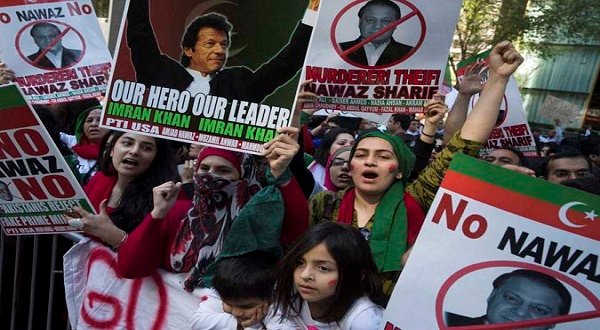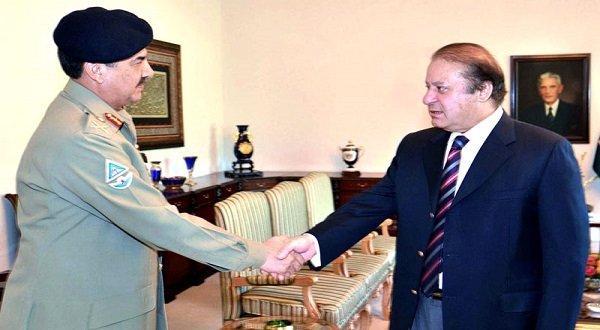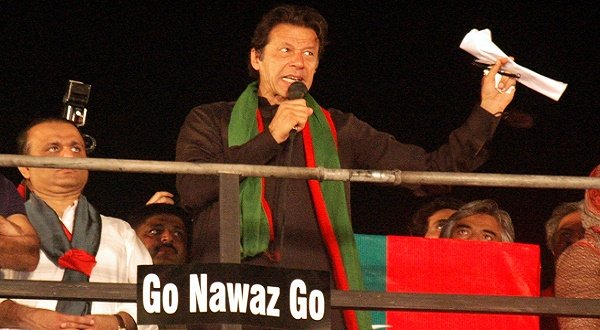
The toll the tense stand-off between the proponents of change and the stake-holders in the status-quo camp is taking is just too heavy for a Pakistan mired up to its eyeballs in crises of all kinds. It’s fast approaching the point where one or the other will have to blink, or the country would simply sink into a morass of their making
KARAMATULLAH K GHORI
[dropcap]N[/dropcap]o, it can’t go on like this. This impasse is killing Pakistan. Something has gotta give, as Americans are so fond of saying in a situation like the one holding Pakistan in its thrall.
The toll the tense stand-off between the proponents of change and the stake-holders in the status-quo camp is taking is just too heavy for a Pakistan mired up to its eyeballs in crises of all kinds. It’s fast approaching the point where one or the other will have to blink, or the country would simply sink into a morass of their making. So all eyes at this crisis-laden moment are riveted on who blinks first.
Nawaz Sharif & Co. may think they have been given a shot in the arm by the army’s decision to take no sides—at least for the moment—in the confrontation. The sigh of relief was amply echoed in Nawaz’ confident foray into the thick of UN General Assembly’s annual jamboree, in New York, in end September. He didn’t say much in his scripted speech delivered with his trade-mark placidness. There wasn’t much for him to say, in any case.
Nawaz was shunned by Obama and deliberately ignored by India’s Modi who had accorded him a hero’s welcome just four months ago in Delhi at his own coronation. But for a beleaguered Nawaz hanging by the flesh of his teeth to power in Pakistan these slights were not so much as insufferable. The first thing power does to a leader in Pakistan is put on him a skin as hard and insensitive as a turtle’s shell.
I don’t know if Nawaz took notice of hundreds of those red-blooded Pakistanis who’d gathered outside the UN building on Manhattan’s 1 st Avenue to throttle in chorus the by-now-familiar Pakistani slogan of ‘Go Nawaz Go.’ I know of several of my nephews and nieces who made it a point to be there; some travelled long distances to make it to Manhattan on September 26. They were keen that their Mamoonjan should also be there to lend their agitation some sheen of old-age authenticity. But I decided to leave the show to more robust throats and warmer blood, not that I’ve grown cold-blooded. No way.
But even if Nawaz whisked past the throng of those young Pakistanis without noticing them there’s no denying that Imran Khan’s relentless thrust against his citadel of power has much of the Pakistani diaspora in North America all zeroed on in it. Why the Pakistani diaspora is so overwhelmingly on Imran’s side in the ongoing battle of nerves in Pakistan has more reasons than one. However, if there’s to be just one reason for it—overarching or subsuming all others—it’s that they are fed up with the massive corruption that informs the Nawaz government as much as it did the gang of robber- barons who abetted that notorious character, Zardari, in his full five-year stint at bankrupting Pakistan.
Nawaz may suffer from a misplaced burst of complacency. He may think he has weathered the storm IK and Tahirul Qadri (TuQ) had kicked up. Nawaz, in any case, was never known for much of imagination but appears totally barren of it in this third—and last, as all indicators vouch—innings in power. He may have the GHQ’s elegantly-attired and bejeweled generals in his corner—for their own self-interest—but he must be living in a fool’s paradise if he thinks he also has the people of Pakistan behind him.
Imran, in marked contrast, has changed tack for the better. He was getting stumped and bogged down in his crease in the Islamabad Dharna, which had run out of steam and was going nowhere. Going first to Lahore and then to Karachi—the two vibrant metropolis of the country—was a brilliant move that has paid off. The intelligentsia of both cities, especially the youth, has responded to him with enthusiasm thus infusing his flagging movement with a new dynamism. IK was on the cusp of waning; Karachi and Lahore have given him a big boost in the arm.
However, the revival of Imran’s agitation doesn’t bring the crisis anywhere near a solution. Quite the contrary, it compounds it. With both sides unwilling to concede any space to the other and digging in their feet a way out remains as distant as it was before Imran rediscovered his popularity with the urban intelligentsia; it remains the bastion of his power and he’d be best advised to stick to it.
That prompts the question where do we go from here in search of a way out of this impasse? What is it that may circumvent the gridlock?
Partisans of both sides have been hawking myriad solutions to break the logjam, some of which are, to say the least, quite outrageous if not wacky.
There’s, for instance, one suggestion robustly being bandied about by an intellectual luminary of Imran—who’s also a stalwart advocate of General Pervez Musharraf and is believed to have largely ghost-written his ‘auto-biography’—peddling the idea that the May 2013 election be declared null and void and illegal with the stroke of a pen.
The ostensible premise of this hare-brained ‘solution’ is a recent report of the Election Commission of Pakistan which speaks of various ‘irregularities’ detected in a number of constituencies, particularly those disputed by Imran. The EC report nowhere in it speaks of cheating—the center-piece of Imran’s agitation. Irregularities there no doubt were committed largely because of the inefficiency of the staff recruited to conduct the last elections.
One will be hard put to come up with many examples of previous elections in Pakistan where irregularities were not conspicuous. Perhaps the only exception to this paradigm was the 1970 election conducted by the Yahya regime; that ‘miracle’ happened because Yahya had no stakes on the line in its outcome other than his khaki colleagues’ misplaced hope that it would produce a hung parliament. That it spawned Pakistan’s dismemberment is a memory that still sends shivers down the spine of every loyal Pakistani.
So, getting back to the bedeviling question of where do we look for the holy grail of a solution of this national imbroglio of Pakistan, there’s precious little light at the end of the tunnel that we find ourselves in. Groping in the dark for a way out is tense and enervating. But a way out has to be found or we’d flounder in darkness for God knows how long.
Another brainy idea being put on the menu as likely palatable is for the apex court of the country to take suo moto notice of the national paralysis and act as judge, jury and hangman to send the Nawaz government packing. Tempting as it may be, it isn’t digestible for the simple reason that it would violate the sanctity of constitutional parity of the executive, the judiciary and the parliament and foist the judiciary on top of the other two. That would be a recipe for self-destruction of the delicate constitutional order put together in quest of equanimity of the federation.
The only workable solution that comes to the mind of this scribe—with outright admission of his limited comprehension of Pakistan’s arcane political choreography—is a rehash of the famous (or infamous?) Kakar Solution, invoking the formula coined to settle a similar impasse in Nawaz Sharif’s first stint in power in the early 1990s.
Back, then, the then army chief, Abdul Waheed Kakar, had stepped into the fray—after Nawaz, initially fired by President Ghulam Ishaq Khan by the use of the damned Article 58 (2-B) of the constitution was restored to his position by the apex court—to ease both adversaries out of office, thus paving the way for fresh general elections and a clean slate for the state to begin with.

So, the search for the holy grail of a solution takes us to the doorstep of the traditional arbiter of politics in Pakistan: the incumbent military chief.
It isn’t something that may be flaunted with pride, or relished as a feather in the army’s cap. But, damn the clueless political wizards of Pakistan who are so mired in the bog of their petty egos that they just can’t take one step out of it to seek a solution between them without the need of the only arbiter available in the Land of the Pure.
But this time around, it will have to be done with a difference—a badly needed difference, at that, given the complexity of the situation.
First, General Raheel Sharif will have to knock the fear of god in the stoned mind of his namesake that he should step down, voluntarily, in the interest of Pakistan that he has been hawking with so much flourish all the time. Legally, and in terms of the strict interpretation of the constitution, Nawaz may be in the right to insist that he can’t be hounded out of his office as elected PM through agitation of any kind.
But in the scheme of things in any civilised society there’s something still higher and more elevated than the letter of the law. That higher thing is the spirit of morality. Every child in any organized society, including Pakistan, is taught in his elementary school that morals take the highest honours in matters pertaining to mankind. I was taught this in my primary school that when wealth is lost, nothing is lost; when health is lost, something is lost; but when moral is lost, everything is lost.

What IK’s dharna, and the subsequent enlargement of his agitation to the urban heart of Pakistan has done is—above everything else—rob Nawaz of whatever moral strength he had as the leader of Pakistan. No more can any morality be associated with his persona as PM. Legitimacy or no legitimacy, but Nawaz has lost his moral grain with the people of Pakistan. And ruling without the force of moral power underpinning anyone’s rule is like living in someone’s house as a tenant whose lease has run out.
In his own interest, Nawaz ought to go with dignity. Yes, there should be no bar against him running for office in an open election supervised by the only organized and disciplined institution of Pakistan: its military. Why should NS be scared of going back to the people and testing his fabled ‘popularity’ with them? If he thinks his popularity and public approval hasn’t been tainted by all that IK has been attributing to him, he should’ve no fear in going back to his touted popular base. What’s there to fret about?
But before the umpire waves the green flag to usher in another round of elections under his watchful eyes, there are a few things he must do to ensure that he will not be presiding over a mere regurgitation of a tried-and-tested-but-found-wanting exercise.
A fresh round of elections mustn’t be entered into until the following things have been done.
One, there should be a quick census of population to know exactly how many people there are in the country. It’s a case of deliberate and criminal neglect that no fresh census has been held in Pakistan since 1990. Elections on the basis of old census figures would be a bogus undertaking.
Two, a new ECP, independent in real terms, powerful with meaningful power and authority under its belt and not subservient to this or that institution or power base must precede fresh elections to ensure there’s no cry of cheating or bungling from any quarters. The first task of this revamped ECP should be to redraw the present constituencies drawn largely for the convenience of partisans of status quo.
Three, an equally robust and independent judicial commission must also be constituted to take care of post-electoral settling of disputes.
There is no gainsaying that the real focus in choosing the people to man these badly needed institutions must be on men of integrity and honesty; men without fear or favor. And there’s no dearth of honest and honorable men—capable men, at that—in Pakistan. They don’t volunteer to come forward because of the muck-raking that our politicos—mostly ignoble and puny men, if not poltroons, rogues and scoundrels—indulge in freely and mischievously to keep honest men away from policy and decision-making. That Gordian Knot ought to be broken in the interest of the future of Pakistan.
___________
All opinions and views expressed in columns and blogs are those of individual writers and do not necessarily reflect the editorial policy of Caravan

